Follow us on Telegram for the latest updates: https://t.me/mothershipsg
People work out for a variety of reasons – reduce weight, increase health, or to release some much needed endorphins.
Growing up, my own reason had a lot to do with staying slim and petite, because that was what I perceived to be the standard of beauty.
Comments like, “Did you gain weight?”, or “wa got a bit of a tummy ah”, even if said playfully, further fuelled this all-pervasive convention, and I’ll admit that even today, on certain days, I think twice about treating myself to that extra slice of cake.
So it was a refreshing change when I spoke to Hayley Khwang, 26, as well as Shehana Zulazmi, 33, who have rebuffed these usual beauty conventions, and are proud of it.
Both women are Singaporean powerlifters, with Khwang having been in the sport for seven years, and Shehana for four.
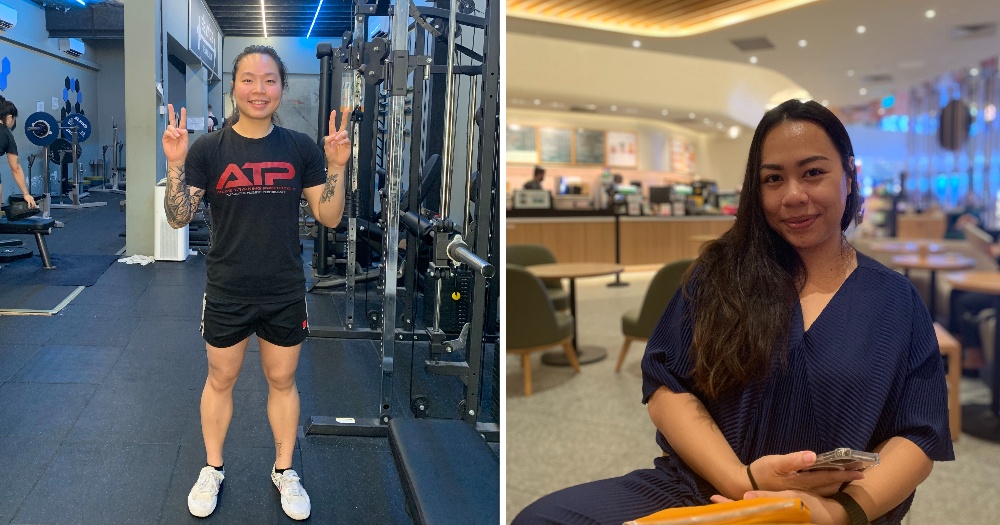 Hayley Khwang (left), and Shehana Zulazmi (right).
Hayley Khwang (left), and Shehana Zulazmi (right).
They share how the sport has built up their own body positivity, and reveal what powerlifting entails. They also share why they are so passionate about the sport.
An empowering sport where strength is king
In the powerlifting community, strength is king — an attitude Khwang has internalised by now. But, growing up, she’d faced vastly different influences.
She explains that she had been teased for being “too buff” in the past, with comments by those around her ranging from “Eh maybe you shouldn’t go to the gym so much” to “You don’t want to get too manly”.
At one point in her teens, Khwang even decided to stop going to the gym for several months completely.
It would prove to be a pivotal turning point in her life, as she eventually came to the conclusion that she enjoyed going to the gym far too much to be dissuaded by armchair critics.
“I would rather do what I like to do, than try to fit myself into what people think I should do,” she said.
“That is a very sad life.”
Since then, powerlifting has only further empowered Khwang to feel self-assured about her body.
Being a full-time coach at The Barbell Club, a local gym in Singapore, Khwang shares that she usually trains there up to four times a week, often in between her sessions with clients.
Building muscle mass is important, as it correlates closely with the power and strength that are inherently crucial for the sport.
Khwang further explains:
“Because of the weight class, if you cut too much [diet too intensively], you actually get weaker. Mass moves mass, so the more muscle mass you have, the more likely you are to be stronger, and the more likely you are to be successful in your lifts.”
So, while Khwang used to watch what she ate in a bid to get lighter, she shares that now, she naturally does the converse in order to ensure that she meets her weight class, and also so she has enough energy to sustain and fuel training.
This mindset shift helps Khwang refocus on her body’s capabilities rather than its appearance:
“It’s not to say I no longer care how much I weigh, but in a sense it has shifted my mindset away from ‘I’m defined by the weight on the scale’ to ‘I’m defined by how I approach my training, my mental strength, and how strong my body is.’”
“I would [now] take ‘buff’ as a compliment,” she added.
Of course, they’re aware that not everyone shares their mindset.
But Shehana says strength training has benefits for women who want to avoid building up unwelcome muscle mass too.
Developing “Arnold Scharwaggenzer-big” muscles is physically impossible for most women, she explains.
As such, the belief that women should avoid lifting heavy weights to avoid getting bulky is in fact, a myth.
On the flipside, the belief that one can get “toned” through lifting more repetitions of lighter weights is now also considered a myth, with more research emerging on the topic. Instead, getting “toned” is essentially a process of muscle development along with fat loss — something that can be achieved through strength training and dieting.
Khwang elaborates that getting bigger really only happens if it’s something you truly want and push yourself to get.
“If you don’t want to be as big, you won’t be able to.”
Becoming strong physically and mentally
For Shehana, who has two young daughters, trying to become the strongest version of herself is important as she wants her girls to know that being strong is “cool” too.
“Growing up, they shouldn’t be looking at me struggling to lose weight or whatever.”
Shehana adds that powerlifting is not just about getting physically strong, but growing in terms of one’s mental resilience.
It’s a herculean task dealing with the stress and fatigue from training, not to mention the tenacity needed to push past one’s failures and break personal records.
Shehana notes that especially now, with the sport growing, it can be worrying when one’s performance seems trivial in comparison to others in the same weight class.
For her, the key thus lies in looking at the numbers with a positive mindset, and “power up”, instead of beating oneself up about it.
Her advice is:
“Just own your journey and be proud of where you are now, because it’s the furthest that you’ve been.”
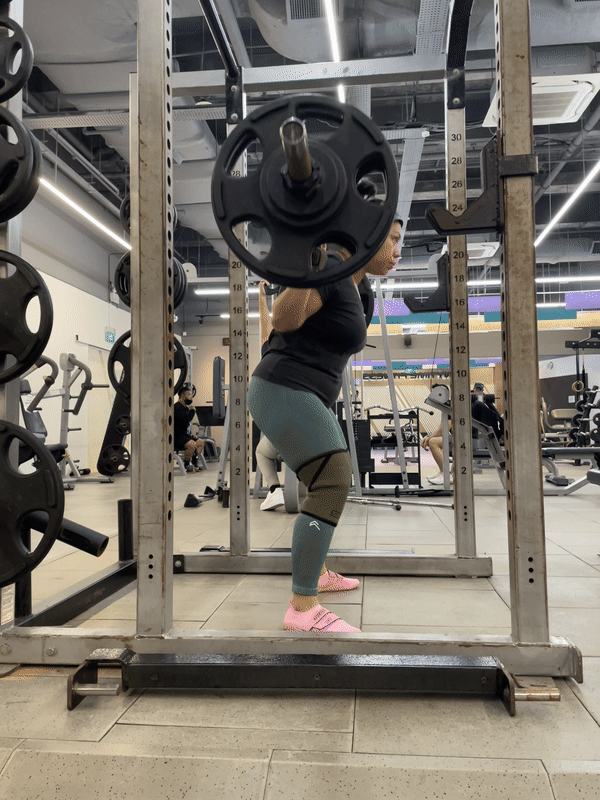 Shehana in Dec. 2021, doing five reps of squats lifting 107.5kg. By Shehana Zulazmi
Shehana in Dec. 2021, doing five reps of squats lifting 107.5kg. By Shehana Zulazmi
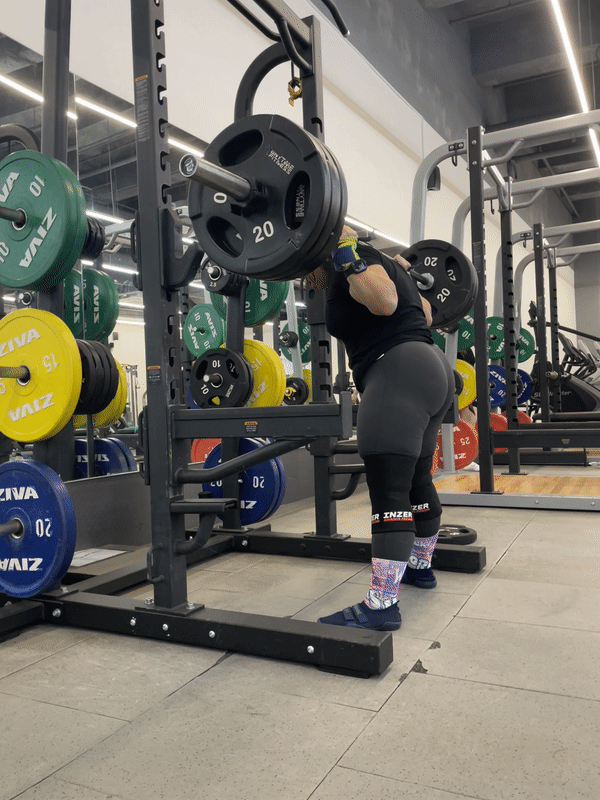 Shehana now, in Jan. 2023, warming up with six reps of squats lifting 140kg. By Shehana Zulazmi
Shehana now, in Jan. 2023, warming up with six reps of squats lifting 140kg. By Shehana Zulazmi
In powerlifting competitions, athletes are given three attempts in each of the three “disciplines” – squat, bench press, and deadlift. The heaviest weights they lift in each discipline are added together to make up their overall score.
This can be nerve-wracking, Khwang says, as the entirety of one’s training essentially boils down to those nine attempts on stage. Athletes have to clock at least one successful lift for each discipline, in order to remain in the competition.
In that sense, Khwang shares that the competitions have pushed her to become a “better version of herself”.
“It forces me to be a bit more brave in trying.
There’s also always more things to work on, be it for technique or in terms of your numbers. The ceiling can always be broken.”
Getting into powerlifting
While both Khwang and Shehana are constantly seeking improvement, they both started powerlifting with somewhat different motivations, namely, to get fit and lose weight.
Both women were already “lifting casually” before they picked up the sport, with Khwang having gone to the gym since her teens, and Shehana picking up a love for gymming as a rugby player in university.
Khwang remembers getting “hooked” on powerlifting after she was introduced to the sport in university, as it presented a “perfect blend” of what she enjoyed doing – lifting heavy, learning the techniques, and being able to compete.
As for Shehana, she began her powerlifting journey after giving birth to her second child in 2019.
She dived into the sport headfirst with a personal trainer – another powerlifter and her personal friend – Farhanna Farid.
Winning for Singapore
Today, Shehana and Khwang have not only represented Singapore at international competitions, but have also returned with medals.
In 2022, Shehana set a national record at the Asian Classic Powerlifting Championships held in Dubai.
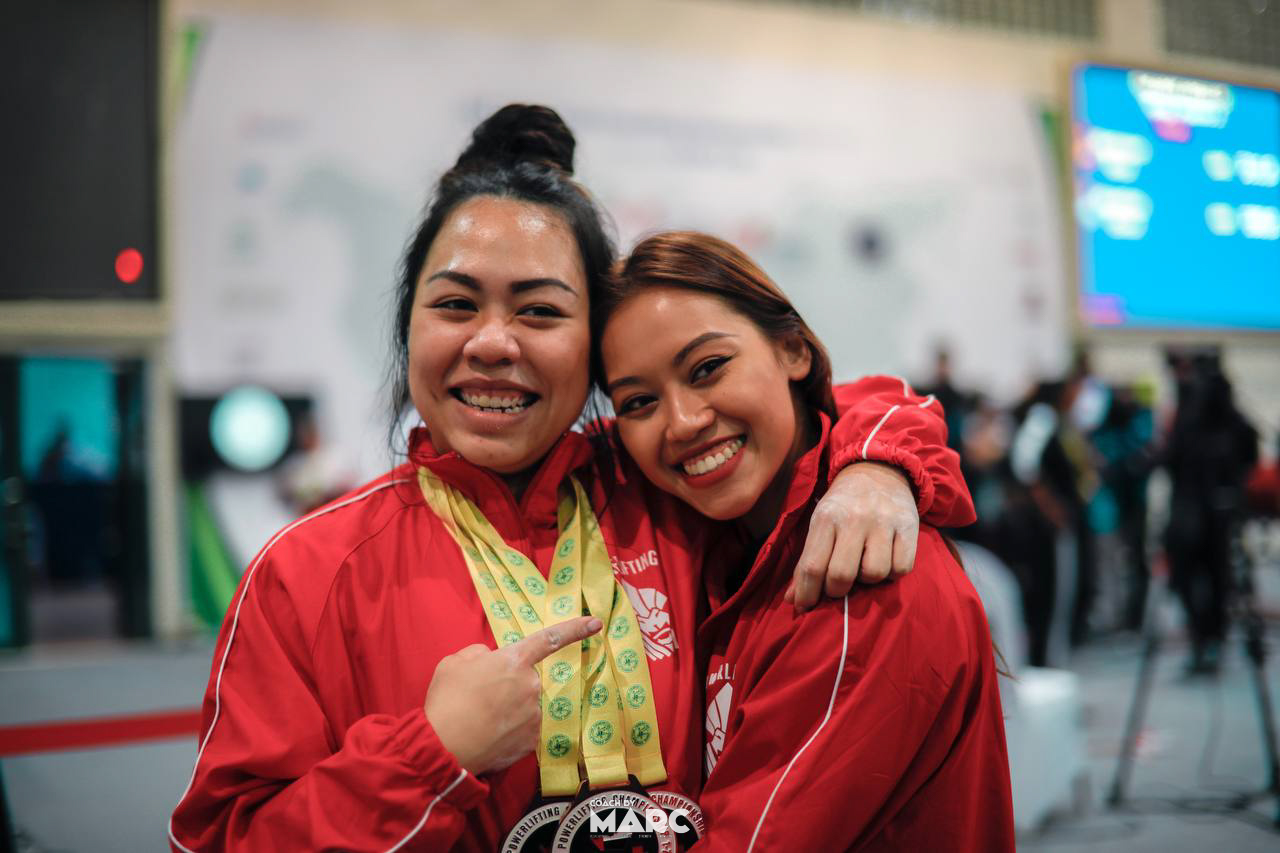 Shehana with her coach, Farhanna. Image via Olivia Gan
Shehana with her coach, Farhanna. Image via Olivia Gan
She also bagged a silver medal in the U76 open category by lifting more than twice her body weight in the squat discipline with an impressive 180kg.
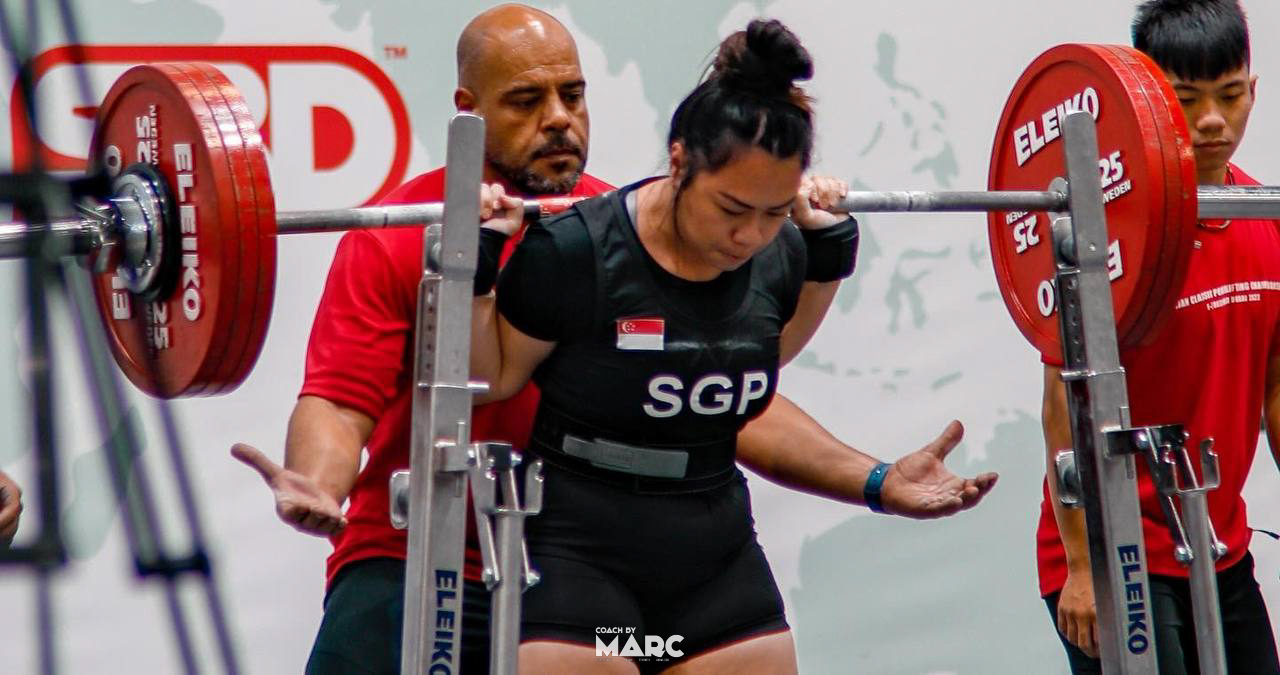 Image via Olivia Gan
Image via Olivia Gan
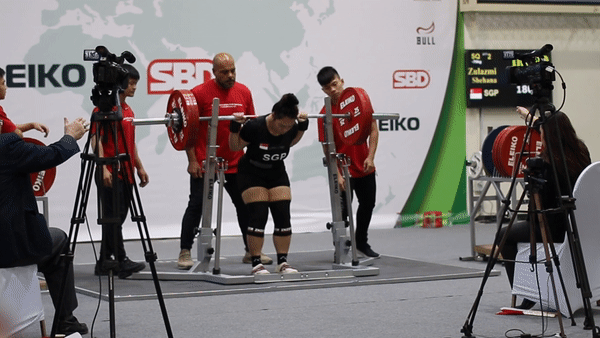 Shehana carrying out her successful 180kg squat attempt in the Asian Classic Powerlifting Championships 2022. Video via Olivia Gan
Shehana carrying out her successful 180kg squat attempt in the Asian Classic Powerlifting Championships 2022. Video via Olivia Gan
Khwang clinched four medals in the same competition – two golds and two silvers.
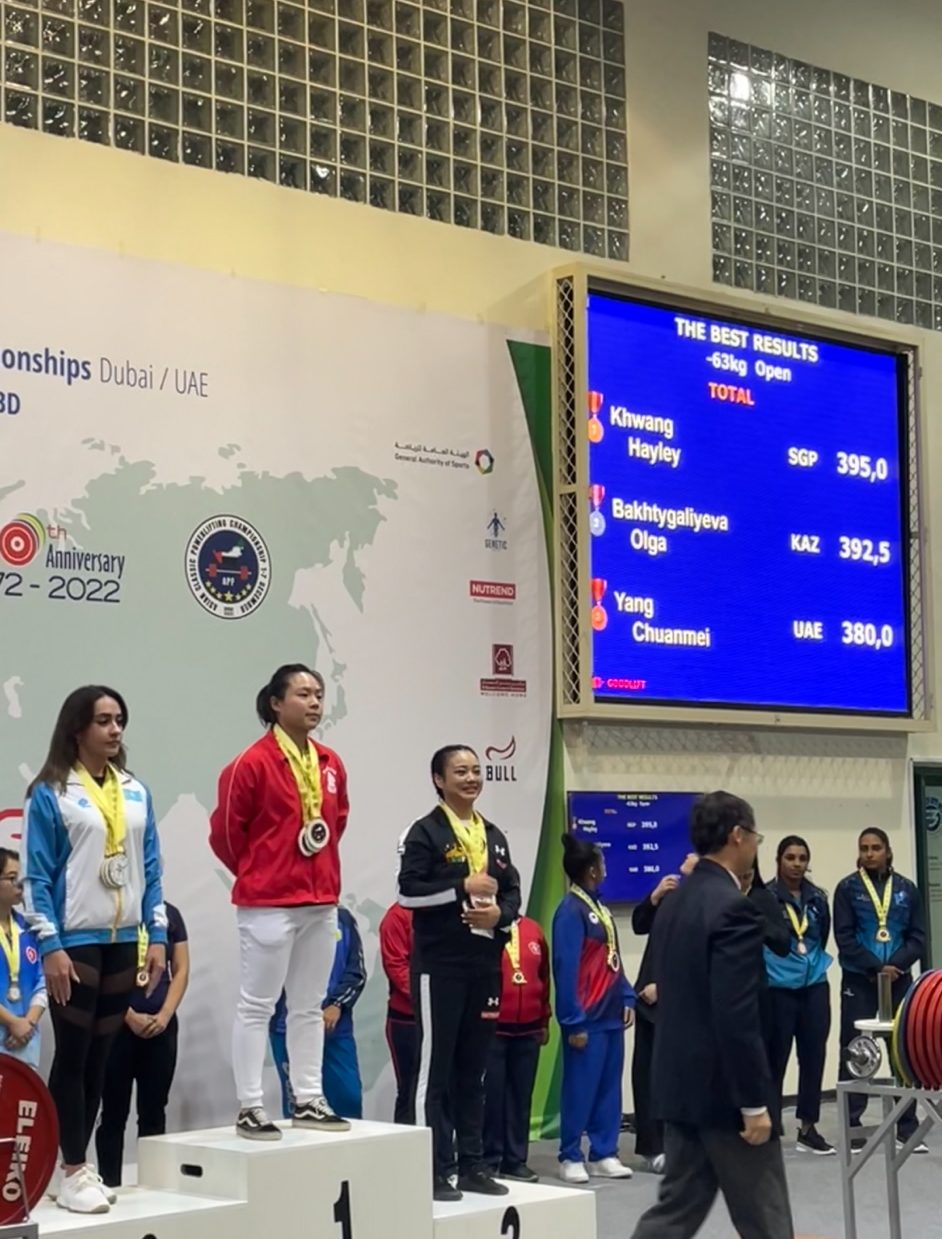 Khwang on the podium at the Asian Classic Powerlifting Championships 2022, emerging as the overall champion in the U63 Open category by lifting a total of 395kg across all three disciplines. Image via Hayley Khwang.
Khwang on the podium at the Asian Classic Powerlifting Championships 2022, emerging as the overall champion in the U63 Open category by lifting a total of 395kg across all three disciplines. Image via Hayley Khwang.
She not only topped her category in the squat discipline, where she lifted 142.5kg, but also scored her second gold with the highest overall score, having benched 87.5kg and deadlifted 165kg.
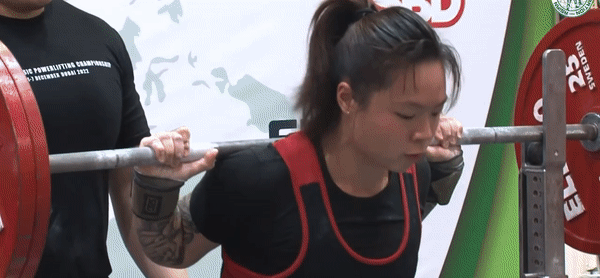 Khwang on her 142.5kg squat attempt. Screengrab via video by Hayley Khwang.
Khwang on her 142.5kg squat attempt. Screengrab via video by Hayley Khwang.
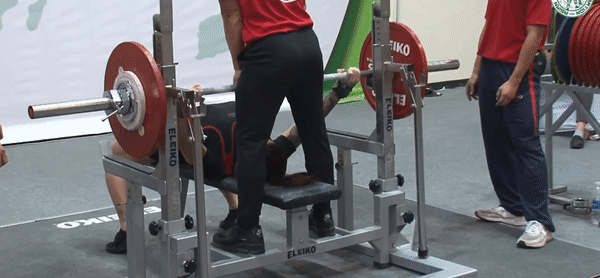 On her 87.5kg bench press attempt, she had failed to lift the same weight on the previous attempt but succeeded on the last try. Screengrab via Hayley Khwang.
On her 87.5kg bench press attempt, she had failed to lift the same weight on the previous attempt but succeeded on the last try. Screengrab via Hayley Khwang.
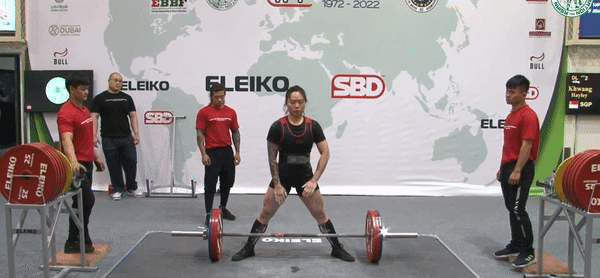 Khwang on her 165kg deadlift attempt. Screengrab via Hayley Khwang.
Khwang on her 165kg deadlift attempt. Screengrab via Hayley Khwang.
What makes these achievements all the more notable is the fact that Khwang and Shehana are part-time athletes.
Their challenge was to train within the confines of full-time jobs, all while managing a laundry list of other responsibilities.
For Shehana in particular, who is also a Secondary school art teacher, operating a highly efficient routine remains the only way she can head to the gym for two-hour sessions three times a week.
Sometimes, Shehana has to push through the fatigue of training on consecutive days — but she explains that she believes it’s necessary to “put in the work” to meet her lifting goals.
Her family also serves as a major motivating factor.
“[My mum, husband, and in-laws] are always there to help me out with my kids and are very supportive of what I do.
So I think, also because I know that they’re helping me, I feel like I can’t play around too much. When I know I only have two hours, I just go, go, go.”
The future of powerlifting
Khwang and Shehana expect the sport to grow even more in 2023, with more local and international competitions on the horizon.
Locally, competitions are usually organised by Powerlifting Singapore, the independent governing body for the sport in the country.
Khwang and Shehana plan to compete and qualify for more competitions in the year ahead, to continue representing Singapore internationally.
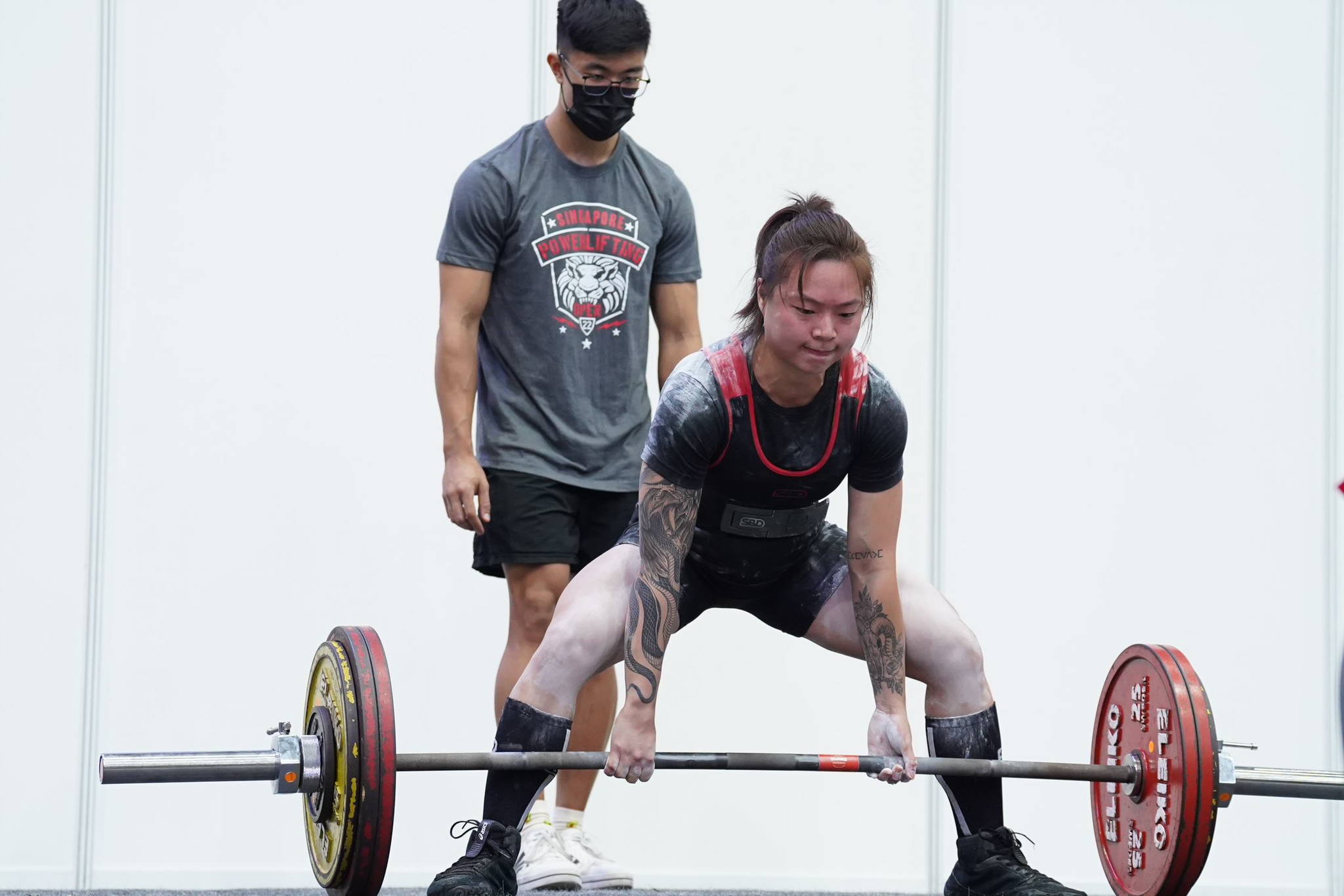 Khwang in the Singapore Powerlifting Open 2019. Image via @cw_lifts on Instagram.
Khwang in the Singapore Powerlifting Open 2019. Image via @cw_lifts on Instagram.
Shehana shares: “I’m hoping that with all this coverage about powerlifting, Singapore will [also] start to see that there are more sports other than whatever’s popular.”
In response to my question on what kind of support she might be looking for, Shehana elaborates that sponsorships would be ideal, but adds that her main wish is simply for all athletes to be recognised for their efforts.
“There’s so many other sports that people are good at, but are not being helped out, or even given recognition to.”
For Shehana, it’d would simply be nice to be recognised for “doing well”.
Even if one does not compete, the sport itself also offers a treasure trove of lessons that can be applied across other aspects of life, and in that sense, does way more than keeping its participants fit.
Khwang, personally, says she has learnt to be “authentically herself” rather than “making herself small” according to the expectations set by other people.
Her parting words to me were her advice for anyone interested to try powerlifting.
“If you’re interested in strength training, don't be intimidated. You can only learn by trying.”
Thinking back on her story, I can’t help but feel she was also addressing the struggles her past self had faced.
Back at The Barbell Club, after the interview, I toured the gym where Khwang works and attempted the three different lifts, under her patient guidance.
Although I started off thinking I’d be deadlifting at most 20kg to 30kg, Khwang decided that I should try my hand at 70kg.
I was doubtful — as a relatively small person, moving a mass that large would surely be impossible.
After some encouragement, I approached the barbell and warped my hands around the knurling.
It took a bit more grunting than I like to admit but I managed to hoist the bar well above the ground and straighten my back. The sense of achievement was intoxicating.
Top images via @cw_lifts and Matthew Yap
If you like what you read, follow us on Facebook, Instagram, Twitter and Telegram to get the latest updates.
